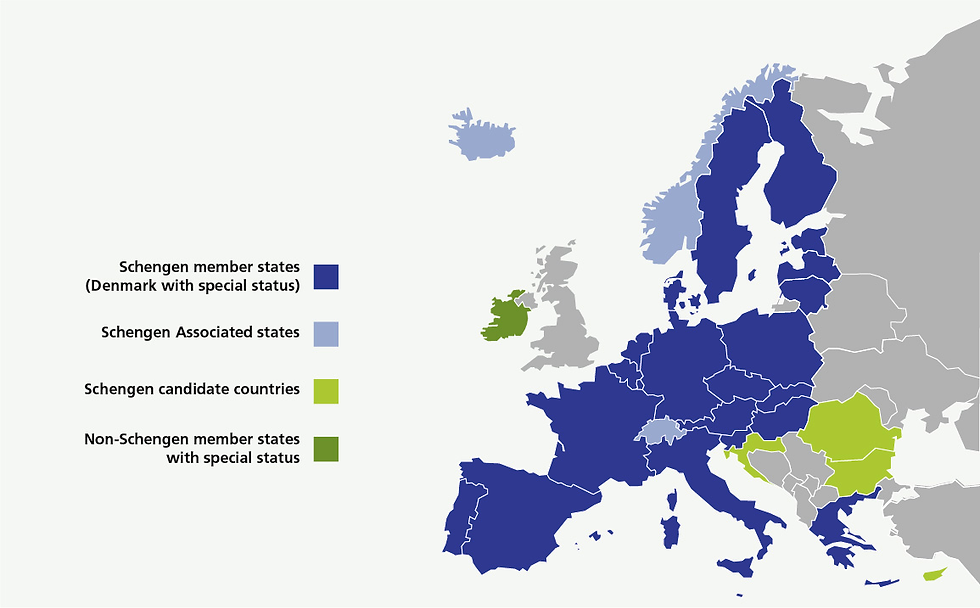Daria Bonca, XI A
The Schengen Area is considered to be one of the most ambitious European Union initiatives in recent years, a single integrated space for the free movement of citizens, businesses and goods within the European Union. Romania, a country which has been a member of the EU for 15 years now, has been seeking to join the Schengen Zone since 2011. This year, a council has been called in order to decide whether this long-term ambition would be fulfilled. Unfortunately, Romania has been refused entry due to The Netherlands and Austria’s opposition.

One of the main reasons why Austria and The Netherlands have opposed Romania’s accession to the Schengen Zone is, supposedly, due to the concern about the country’s ability to prevent illegal immigration, human trafficking, and terrorism. Romania has been seen as a potential “bridge” country for potential transit from non-Schengen countries, such as Turkey and the Balkans, to other EU countries.
Austria, in particular, has been outspoken in its criticism of Romania’s progress in addressing the issues of illegal immigration and terrorism, as well as its weak justice system. Austria has expressed fears that allowing Romania to join the Schengen Zone could lead to an influx of illegal immigrants that the nation may not be able to control. Karl Nehammer, the Chancellor of Austria, stated that 75.000 illegal immigrants entered Austria from Bulgaria and Romania. The data provided by FRONTEX, the European Border and Coast Guard Agency, disproved the Chancellor’s statements, as only 5.700 people choose Eastern Europe as a route, in contrast with the 93.000 who choose the Central Mediterranean route and the 14.000 who opted for the West Africa route. Despite the European Commission’s assertion of a trust fund of up to €30 million that Romania should contribute to, Austria has remained unconvinced.
The Netherlands does not actively oppose Romania, but rather, apparently, opposes Bulgaria. However, unfortunately, the two Eastern European states are a package deal. Ideas of disengaging the two states have been vehiculated by the press, yet it is unlikely to happen. In order for this to happen, the south of Dobrogea and the Danube River would become external borders of the European Union and inherently, the southern border of Romania would have to be guarded. Thus, in order for Romania to enter the Schengen Zone, The Netherlands have to approve Bulgaria as well.

The real reason for Austria’s opposition remains unknown, as Romania has been Austria’s prime partner for natural gas and not only. In 2020, Austria and Romania signed an important contract concerning the supply of natural gas. This deal strengthens Austria’s position as an important energy provider to the European Union. Austria will provide up to 4.5 billion cubic meters (bcm) of natural gas a year to Romania for the next 15 years. The gas will be transported to Romania via the future Austrian-Romanian interconnector pipeline and another pipeline through Bulgaria. Romania will pay for the natural gas using money from the European Union. The Austrian-Romanian Agreement is part of the European Union's broader strategy towards increasing its energy security, diversifying its energy supplies and reducing its CO2 emissions. It is also an important part of Romania's commitment to reducing its reliance on energy imports from Russia.
The agreement bolsters the energy position of both Austria and Romania, as well as the European Union as a whole. It encourages the diversification of energy resources, with Austria promoting its role as an important energy supplier to the EU. For Romania, the deal allows the country to reduce its dependence on Russian gas imports while increasing its energy security.
In order to ensure Romania’s success, the minister of internal affairs, Lucian Bode, visited Vienna, where he spoke to the Austrian minister. Gerhard Karner assured Bode of his good intent, stating, “Lucian, I am a friend to Romania and I will always be.”. According to Bode, Austria’s opposition could not be foreshadowed. Moreover, prime minister Ciucă talked to chancellor Nehammer to remind him of the support that Romania has from other countries. Although there have been ample attempts to convince Austrian leaders, political analysts claim that the efforts were futile, as they started too late. The European Commission and the European Parliament both were strong advocates for Romania’s entrance into the Schengen zone. The European Parliament has voted a resolution in favour of Romania, while the MEPs (members of the European Parliament) have negotiated with their respective governments for Romania. The next chance for Romania is during Spain’s presidency over the Council of the European Union or Poland’s. But will it happen?

To conclude with, Austria’s opposition towards Romania’s entry into the Schengen Zone is largely due to security concerns. This includes issues of illegal immigration, terrorism and human trafficking, alongside the apprehension concerning Romania’s weak justice system and the potential influx of criminals from non-Schengen Zone countries. While Romania is making progress towards its accession to the Schengen Zone, Austria remains unconvinced for the time being.

Comments